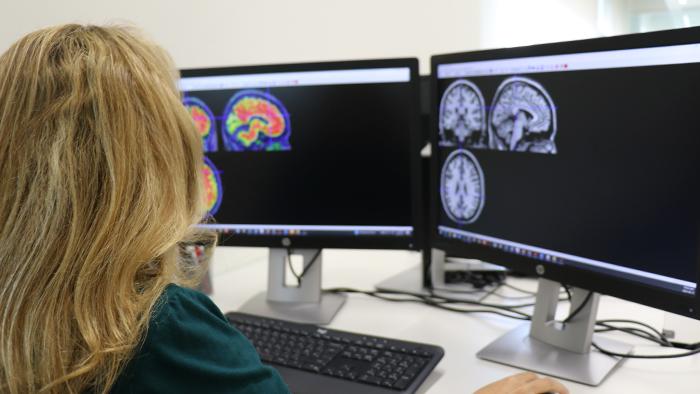12 May | 2023
The European AMYPAD study demonstrates the efficacy of amyloid PET as a diagnostic tool

Thanks to this neuroimaging technique deposits of the Alzheimer’s disease associated amyloid-β protein in the brain can be detected and evaluated.
The AMYPAD Diagnostic and Patient Management Study (AMYPAD-DPMS), in which the Barcelonaβeta Brain Research Center (BBRC), the research center of the Pasqual Maragall Foundation, participated in, has demonstrated the clinical utility of amyloid positron emission tomography (PET) brain imaging early in the diagnostic workup of memory clinic patients. The study showed that access to this diagnostic test resulted in an etiological diagnosis with very high certainty in 40% of patients, within three months of initial clinic visit. This corresponds to a percentage of 3.5 times higher than those who had not undergone amyloid PET. Moreover, amyloid PET changed the initial diagnosis in 44% of cases, compared to only 11% in the group without amyloid PET.
The study, published in the scientific journal JAMA Neurology, also shows that the clinical impact of amyloid PET was consistently observed not only in the population that is considered to benefit most from biomarker evaluation, namely those at an intermediate stage of impairment (mild cognitive impairment, or so-called MCI), but also in subjects at an early stage of clinical dysfunction, experiencing only subjective cognitive complaints and in patients in a late stage of the disease, with dementia level impairment.
“This new clinical trial provides strong evidence supporting the early implementation of this test, as its use is associated with accurate diagnoses,” says Giovanni B. Frisoni, director of the Center for Memory at the University Hospital of Geneva and principal investigator of the study. “A safe and reliable diagnosis is essential for the efficacy of disease-modifying therapies, especially anti-amyloid drugs, whose effectiveness could decrease with the progression of the disease”, he assures.
The relevance of amyloid PET in clinical practice
The buildup of amyloid-β protein plaques in the brain is a defining hallmark of Alzheimer's disease and can begin up to two decades before the onset of symptoms. The abnormal accumulation of these plaques can be measured with positron emission tomography (PET), a neuroimaging technique that is widely used in clinical and research settings.
“Despite the increasing use of this test in clinical practice, real-world evidence on its clinical utility and cost-benefit ratio is still limited. In fact, although several studies have been published, this is the first randomized controlled clinical trial carried out to confirm the clinical usefulness of amyloid PET," says Juan Domingo Gispert, head of the Neuroimaging Research Group of the BBRC, which led the center's participation in AMYPAD.
A study with 840 participants from European clinics
The AMYPAD Diagnostic and Patient Management Study has acquired more than 860 scans to study the impact of amyloid PET on improving diagnostic accuracy in memory clinic populations. “This is a prospective, multicenter, and randomized controlled study, and it is the largest in Europe to evaluate the clinical impact of this diagnostic tool in memory clinic participants,” explains Daniele Altomare, senior postdoctoral researcher and study coordinator at the Laboratory of Neuroimaging of Aging at the University of Geneva and first author of the paper.
For this work, a total of 844 memory clinic patients were examined, of which 840 were finally enrolled in the study. Among the patients recruited, 794 underwent the 3-month visit and were therefore considered for the main outcome analysis; some experienced subjective cognitive decline and increased risk of preclinical Alzheimer's disease (239), while others show mild cognitive impairment (318) or dementia (237).
AMYPAD-DPMS participants come from eight European memory clinics: University and University Hospital of Geneva (UNIGE, Geneva, Switzerland), University of Amsterdam Medical Center, Location VUmc (Amsterdam UMC, Amsterdam, Netherlands), Centre Hospitalier Universitaire de Toulouse (CHUT, Toulouse, France), Barcelona Beta Brain Research Center (BBRC; Barcelona, Spain), University of Cologne (Cologne, Germany), University College London (UCL, London, United Kingdom), Karolinska Institutet (KI, Stockholm, Sweden) and Centre Hospitalier Universitaire Vaudois (CHUV, Lausanne, Switzerland).
Bibliographic reference
Altomare D, Barkhof F, Caprioglio C, et al. ‘Clinical Effect of Early vs Late Amyloid Positron Emission Tomography in Memory Clinic Patients: The AMYPAD-DPMS Randomized Clinical Trial’. JAMA Neurol. Published online May 08, 2023. doi:10.1001/jamaneurol.2023.0997
More information about AMYPAD
The DPMS study is part of the Amyloid Imaging to Prevent Alzheimer's Disease (AMYPAD) project, which over the course of six years has contributed significantly to a better understanding that amyloid PET can improve the diagnosis and treatment of Alzheimer's disease. To do this, the AMYPAD consortium brought together 17 European institutions and has collected almost 3,600 amyloid PET scans.
The AMYPAD project received funding from the Innovative Medicines Initiative (IMI2) Joint undertaking under grant agreement No 115952. This Joint Undertaking receives support from the European Union’s Horizon 2020 research and innovation programme and EFPIA. The list of collaborators is available here.









